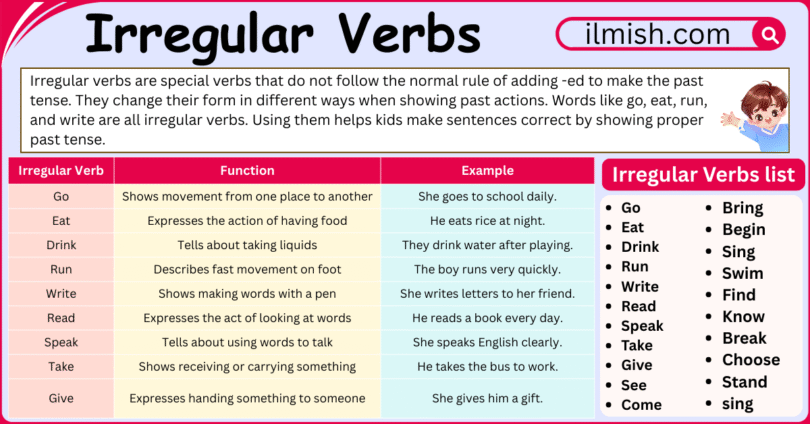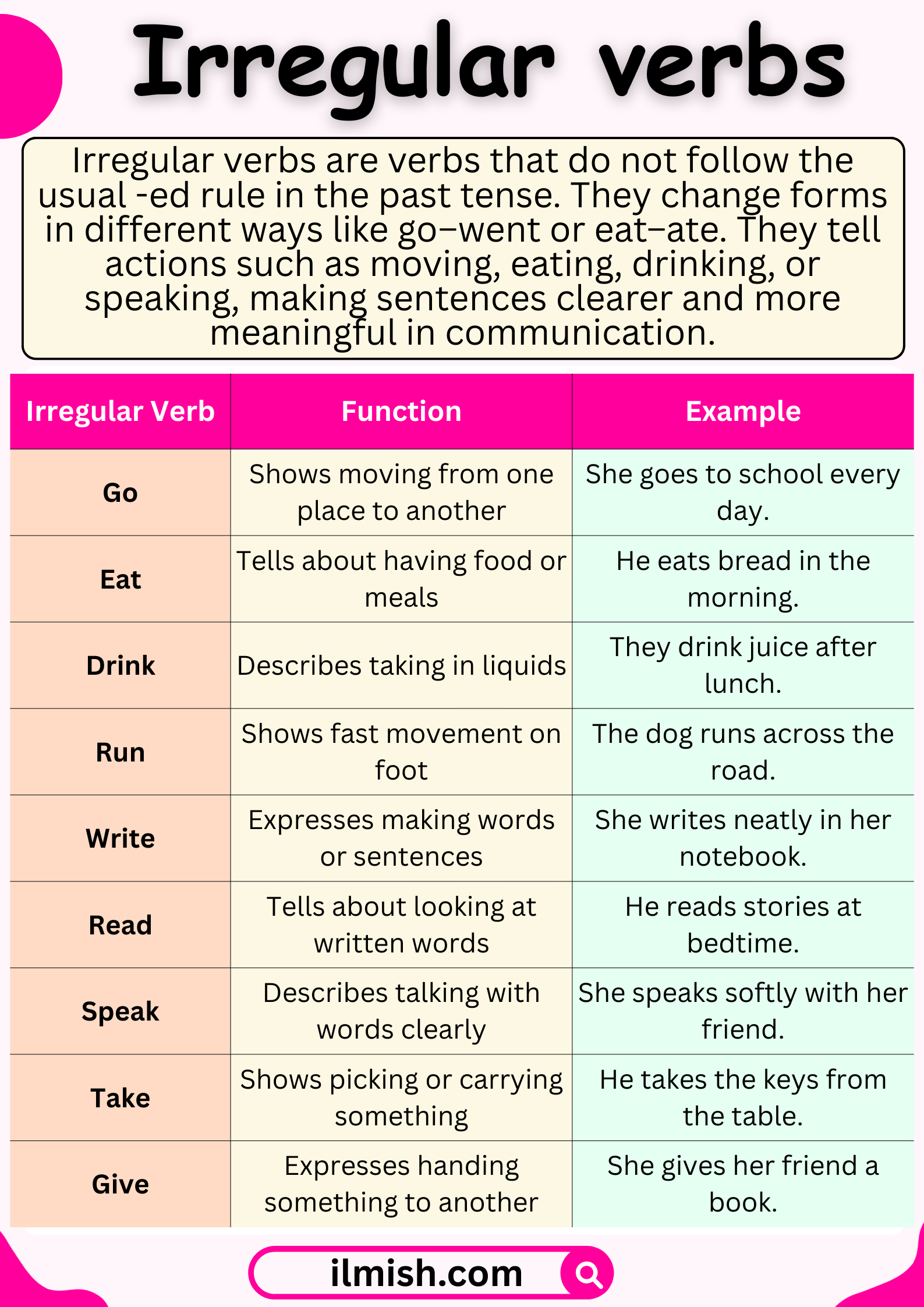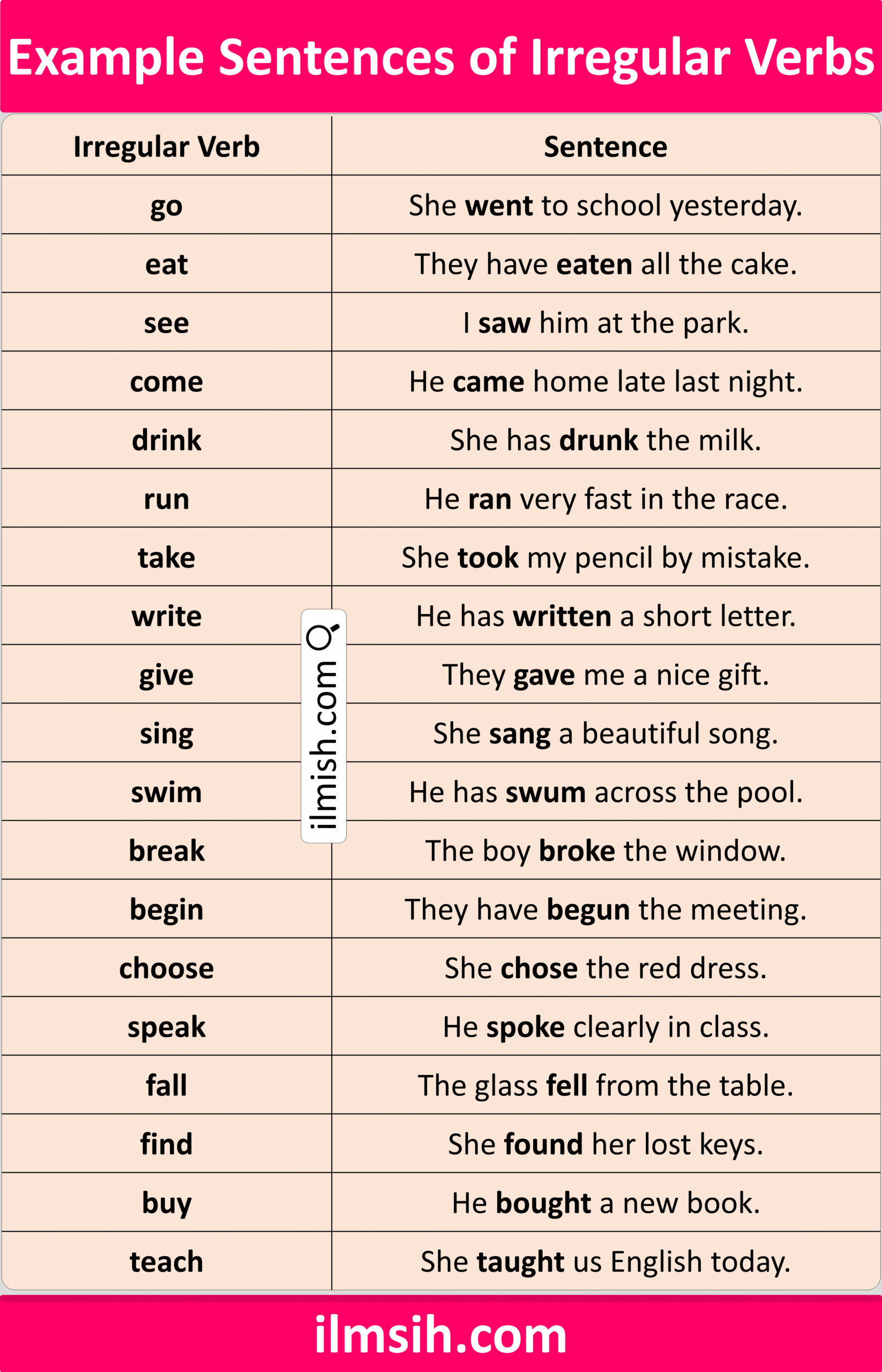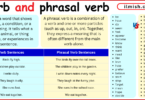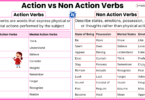Learning English becomes easier when we understand the basic rules and special cases that shape the language. One area that many learners find challenging is irregular verbs, because they do not follow the normal pattern of adding “-ed” for the past tense. Instead, their forms change in unique ways, and that makes them important to study carefully. Knowing irregular verbs with their clear definitions and examples helps learners speak and write English more naturally. In this article, we will learn irregular verbs in English so you can build confidence and improve your communication skills.
Definition of Irregular Verbs
What are Irregular Verbs?
Irregular verbs are verbs that do not follow the standard rule of adding -ed to make the past tense or past participle. Instead, they change their form in different ways, sometimes slightly, sometimes completely.
✔ Example:
- Regular verb: walk → walked → walked
- Irregular verb: go → went → gone
This means irregular verbs need to be memorized because their changes are not predictable.
Why Are Irregular Verbs Important?
Characteristics of Irregular Verbs
- They do not follow the -ed rule.
- Some change vowels inside the word (sing → sang → sung).
- Some remain the same in all three forms (put → put → put).
- Some change completely (go → went → gone).
Common Examples of Irregular Verbs
Here is a table with some of the most commonly used irregular verbs. These are important for daily use and exams.
Basic Irregular Verb for Beginners
| Base Form | Past Tense | Past Participle | Example Sentence |
|---|---|---|---|
| go | went | gone | She has gone to school. |
| eat | ate | eaten | They have eaten dinner. |
| come | came | come | He came late yesterday. |
| see | saw | seen | I have seen that movie. |
| drink | drank | drunk | She has drunk the milk. |
Cover Irregular Verb That Do Not Change
| Base Form | Past Tense | Past Participle | Example Sentence |
|---|---|---|---|
| put | put | put | Please put it on the table. |
| cut | cut | cut | He cut the paper yesterday. |
| hit | hit | hit | She accidentally hit her hand. |
| set | set | set | They set the alarm at night. |
| shut | shut | shut | He shut the window quickly. |
Explore Irregular Verb with Vowel Change
| Base Form | Past Tense | Past Participle | Example Sentence |
|---|---|---|---|
| sing | sang | sung | She has sung beautifully. |
| ring | rang | rung | The phone rang loudly. |
| swim | swam | swum | He has swum across the river. |
| begin | began | begun | They have begun the work. |
| run | ran | run | He has run very fast. |
How to Learn Irregular Verb Easily
Group them by pattern
Example: sing–sang–sung, ring–rang–rung.
Use flashcards
- Write the base form on one side and past tense on the other.
Practice with sentences
Instead of memorizing lists only, use them in short sentences.
Repeat daily
Frequent exposure helps in remembering naturally.
Advanced Irregular Verbs for Exams
Some irregular verbs are less common but are often seen in written English, academic tests, and literature.
| Base Form | Past Tense | Past Participle | Example Sentence |
|---|---|---|---|
| arise | arose | arisen | Problems have arisen in the project. |
| bear | bore | borne | She has borne all difficulties. |
| bid | bade | bidden | He bade us farewell. |
| stride | strode | stridden | He strode confidently into the hall. |
| forsake | forsook | forsaken | He has forsaken his old habits. |
Key Tips for ESL Students
- Always practice irregular verbs in context, not just lists.
- Pay attention to spoken forms, as pronunciation can change.
- Remember that many irregular verbs are used in idioms and expressions.
- Keep a personal notebook of verbs you find difficult.
Example Sentences or Irregular Verb with Images
| Irregular Verb | Sentence |
|---|---|
| go | She went to school yesterday. |
| eat | They have eaten all the cake. |
| see | I saw him at the park. |
| come | He came home late last night. |
| drink | She has drunk the milk. |
| run | He ran very fast in the race. |
| take | She took my pencil by mistake. |
| write | He has written a short letter. |
| give | They gave me a nice gift. |
| sing | She sang a beautiful song. |
| swim | He has swum across the pool. |
| break | The boy broke the window. |
| begin | They have begun the meeting. |
| choose | She chose the red dress. |
| speak | He spoke clearly in class. |
| fall | The glass fell from the table. |
| find | She found her lost keys. |
| buy | He bought a new book. |
| teach | She taught us English today. |
| know | I knew the correct answer. |
List of Irregular Verbs in English
- arise
- be
- begin
- break
- bring
- build
- buy
- choose
- come
- do
- drink
- eat
- fall
- find
- fly
- forget
- get
- give
- go
- grow
- know
- ride
- ring
- run
- see
- sing
- speak
- swim
- take
- write
Learn more helpful articles

